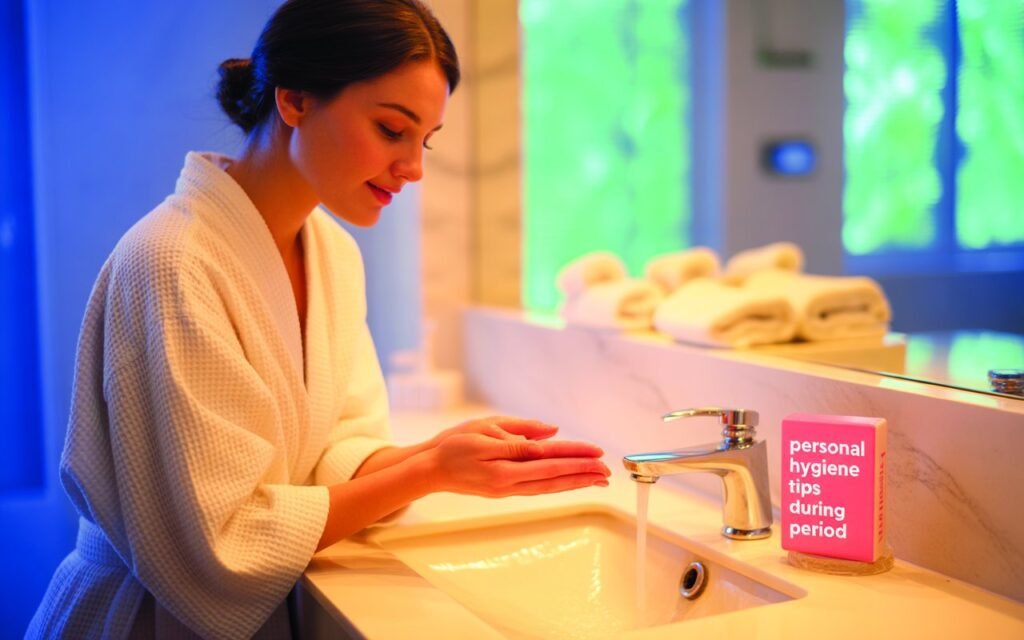Learn essential personal hygiene tips during periods for teenage girls. Stay fresh, prevent infection, manage odor, and build confidence every month.
Introduction
Periods are a natural part of life for every girl and woman, yet they can feel confusing and overwhelming—especially in the teenage years. Along with the physical discomfort of cramps, bloating, or mood swings, many teens struggle with one big concern: personal hygiene. How do you stay clean, fresh, and confident during your period?
The truth is, good menstrual hygiene is more than just comfort—it’s essential for your health. Poor habits can lead to irritation, infections, or even long-term health problems. The good news is that with a few smart routines, managing your period can be much easier.
This guide is written especially for teenagers who are new to menstruation or anyone who wants a refresher on best practices.
Why Period Hygiene Matters
- Prevents infection: Menstrual blood is a natural fluid, but when pads or tampons are left unchanged for too long, they become a breeding ground for bacteria.
- Reduces odor: Freshness boosts confidence, especially in social settings.
- Improves comfort: Clean habits reduce itching, rashes, and irritation.
- Protects reproductive health: Neglecting hygiene can increase risks of urinary tract infections (UTIs) or yeast infections.
Bottom line: caring for yourself during periods isn’t just about feeling clean—it’s about protecting your body for the future.
Washing Properly
Cleanliness starts with how you wash during your cycle.
- Shower daily: A quick shower keeps sweat, bacteria, and menstrual fluid under control.
- Wash the genital area gently: Use plain water or a mild, unscented cleanser. Harsh soaps can upset your natural pH and cause irritation.
- Wipe correctly: Always wipe front to back to prevent bacteria from spreading from the rectum to the vagina.
- Avoid douching: It may sound like it helps, but douching actually disrupts healthy bacteria and increases infection risk.
Managing Odor
Some girls worry that others can “smell” their period. In reality, odor happens only when menstrual blood stays too long on a pad, tampon, or underwear.
- Change products frequently: Replace pads every 4–6 hours, or sooner if flow is heavy. Tampons should be changed every 4–8 hours.
- Choose breathable fabrics: Cotton underwear allows airflow and reduces moisture buildup.
- Stay hydrated: Drinking plenty of water helps your body flush toxins and reduces odor naturally.
Carrying a Period Kit
Being prepared makes life much easier. A small period kit in your school bag or backpack can save you from stress. Include:
- Extra pads or tampons.
- A clean pair of underwear.
- Small pack of tissues or wipes.
- Hand sanitizer.
- A discreet pouch to carry everything.
With this, you’ll never be caught off guard by sudden leaks or early periods.
The Bad Effects of Wearing Scented Pads Too Long
Many brands market scented pads as a way to stay “fresh.” But here’s the truth:
- Fragrance chemicals irritate the skin. They can cause itching, rashes, or allergic reactions.
- Traps bacteria. Scented pads may mask odor but do not prevent bacterial growth.
- Increases infection risk. Wearing any pad—scented or unscented—for more than 6 hours raises the risk of yeast or urinary infections.
👉 Tip: Always choose unscented pads when possible, and focus on changing regularly instead of masking odor.
How to Prevent Irritation and Infection
Irritation and infections are common during periods but mostly avoidable.
- Change products often. Don’t stretch usage to “save” pads—it harms your health.
- Wear loose, breathable clothing. Tight jeans or synthetic fabrics trap sweat and heat.
- Keep skin dry. If your underwear gets damp, change it.
- Avoid scented products. This includes sprays, powders, and wipes around the genital area.
- Listen to your body. If you notice unusual discharge, persistent itching, or burning, see a doctor.
Do’s and Don’ts During Periods
Do’s
- Do track your cycle to be prepared.
- Do eat balanced meals and stay hydrated.
- Do practice good sleep and rest.
- Do exercise lightly—walking, stretching, or yoga can reduce cramps.
- Do carry your period kit everywhere.
Don’ts
- Don’t use one pad or tampon all day.
- Don’t use strong perfumed products on intimate areas.
- Don’t ignore pain that feels worse than normal—it could be a medical issue.
- Don’t feel embarrassed—periods are natural.
Foods to Eat More During Periods
What you eat affects how you feel during menstruation.
- Iron-rich foods: Spinach, lentils, red meat, and beans help replace iron lost in blood.
- Fruits and vegetables: High in vitamins and fiber to reduce bloating and constipation.
- Omega-3 fatty acids: Found in salmon, chia seeds, or walnuts—help reduce cramps.
- Dark chocolate (in moderation): Boosts mood and provides magnesium.
- Plenty of water: Staying hydrated prevents headaches and reduces bloating.
Foods to Avoid During Periods
Some foods can make symptoms worse:
- Salty snacks: Increase water retention and bloating.
- Caffeine: May worsen cramps and disrupt sleep.
- Sugary treats: Cause mood swings and energy crashes.
- Fatty or fried foods: Can increase inflammation.
- Excess dairy: Sometimes worsens bloating for sensitive stomachs.
Friendly Guide for Girls Just Starting Menstruation
Your first period can feel scary—but it’s simply a sign your body is growing and healthy. Here’s a teen-friendly checklist:
- Don’t panic if cycles are irregular. Periods can take 1–2 years to settle into a pattern.
- Experiment with products. Try pads first, then later explore tampons or menstrual cups if you’re comfortable.
- Track your period. Use a calendar or app to note when it starts and ends—this helps you prepare.
- Ask for help. Talk to your mom, sister, or a trusted adult if you’re unsure.
- Stay prepared. Always keep a spare pad in your school bag.
Remember: periods are normal, healthy, and nothing to be ashamed of. With the right hygiene habits, you can stay clean, comfortable, and confident every month.
FAQs: People Also Ask
Q1: How often should a teenager change pads?
Every 4–6 hours, or sooner if the flow is heavy. Overnight pads can be worn longer but should be changed in the morning.
Q2: Is it okay to shower during periods?
Yes. In fact, showers help maintain cleanliness, reduce cramps, and prevent odor.
Q3: Can poor hygiene during periods cause infections?
Yes. Not changing pads or using scented products too long increases risks of yeast infections, UTIs, or skin rashes.
Q4: What if a teen’s periods are irregular?
It’s normal in the first 1–2 years. But if cycles are extremely heavy, painful, or absent for months, a doctor should be consulted.
Q5: What is the best sanitary product for teenagers?
Pads are usually easiest for beginners. Later, girls can try tampons or menstrual cups depending on comfort.
Conclusion
Periods may feel overwhelming at first, but with the right hygiene practices, they don’t have to be uncomfortable or embarrassing. Washing properly, managing odor, carrying a kit, avoiding scented pads, eating healthy foods, and knowing the do’s and don’ts will keep you feeling fresh and confident.
For teenage girls just starting menstruation, remember: your period is a normal and healthy sign of growth. Treat your body kindly, listen to its signals, and never feel ashamed. Good hygiene is not just about looking after yourself today—it’s about protecting your long-term health.

